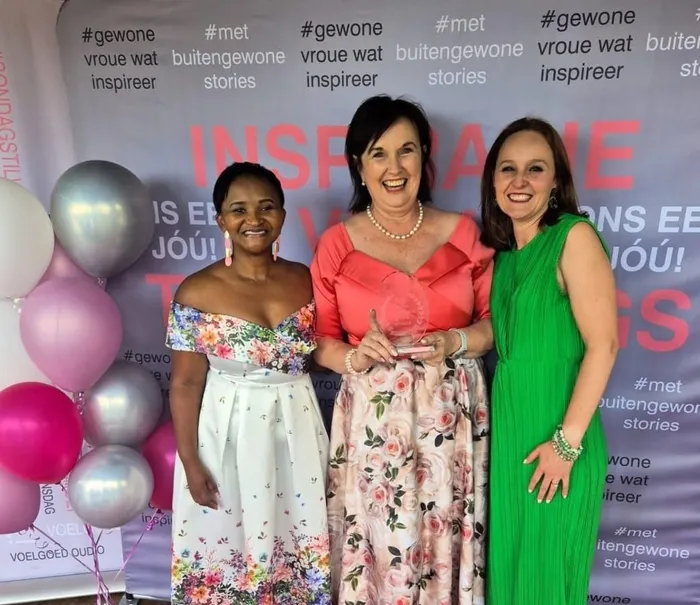Somerset West woman named among Top 3 Inspirational Women of the Year

Natashia de Wet from Somerset West (far right) was named among the Top 3 Inspirational Women of the Year this month in Pretoria by a brand that celebrates women driving positive change across South Africa. She is pictured here with other winners, Berenice Kogana, left, and Santi Britz in the middle.
Image: Supplied
Natashia de Wet, of Somerset West, has been recognised with a national award for her work in preventing tons of food waste from ending up in Cape Town landfills through an innovative community composting programme.
She was named among the Top 3 Inspirational Women of the Year this month, in Pretoria, by a brand that celebrates women driving positive change across South Africa.
Out of hundreds of entries, Ms de Wet was selected for the Top 50 by a panel of judges before the public voted for the Top 15 finalists. She ultimately placed in the Top 3.
She began the composting programme in 2018 after deciding to put her passion for nature conservation into action.
“I wanted to save nature and started researching what ordinary people could do to make a meaningful difference,” she said.
Her research led her to talks at the Two Oceans Aquarium, visits to recycling facilities, and to the realisation that bees and other pollinators were under pressure due to shrinking food sources. To help restore pollinator habitat, she decided to start planting, but realised that creating healthy soil was the first step.
With guidance from her father, a soil scientist based in Grabouw, she discovered bokashi, a probiotic composting system that uses fermentation to break down food waste without causing bad smell or rot. She tested the system at home before rolling it out to the wider community.
In February 2019, she partnered with the Somerset West Village Garden, where residents began dropping off their filled 25-litre household bokashi bins. She said more than 5 000 bins, equivalent to 70 tons of food waste, have been processed ever since, with the compost used to grow vegetables.
These vegetables support charity and community food-security programmes in Somerset West. The programme not only reduces greenhouse gas emissions, saves landfill space and protects groundwater, but also returns organic matter to poor soils, Ms de Wet said.
“In nature, food waste is supposed to go back to the soil. By doing that, we are feeding the soil and feeding people,” she said.
In 2022, she expanded the initiative to the Somerset West Family Shelter, where she and colleague Jenny Findlay established a working vegetable garden. She has also trained local restaurants and wine farms to compost or bury their fermented food waste on-site to improve recycling and reduce disposal costs.
She said that across all initiatives combined, more than 200 tons of food waste have now been diverted from landfill.
“It just shows that small actions every day can have a massive impact. This is something people can do from home. When communities take ownership of their waste, the environment and the people benefit,” Ms de Wet said.
Ms Findlay is the founder of the Somerset West Village Garden. She said the composting programme is "fantastic, helps the environment and keeps all the food waste out of the landfill, and turns it into a healthy compost for our garden."
The organiser of the competition, Venessa Schoeman, applauded Ms de Wet for her efforts in redirecting food waste away from landfill. She said the competition ended with the top three receiving equal recognition as winners.
“Besides the title as one of our country’s most inspirational women, she also won a product hamper worth more than R2 000 and was awarded a certificate of recognition,” she said.
Related Topics: